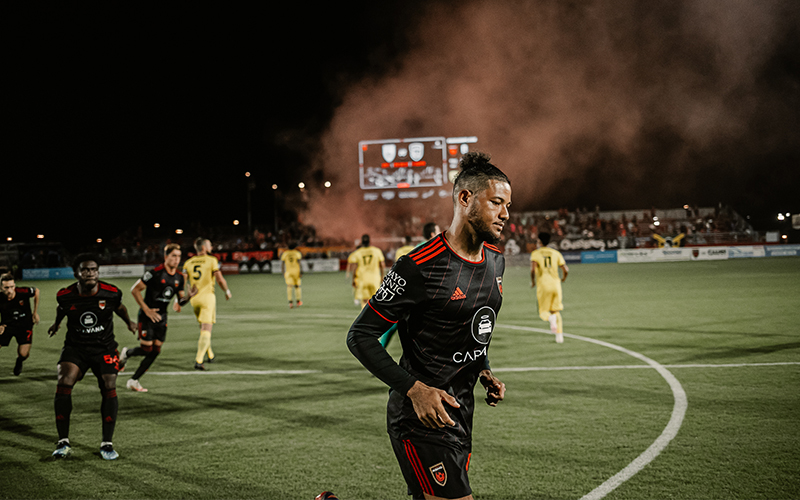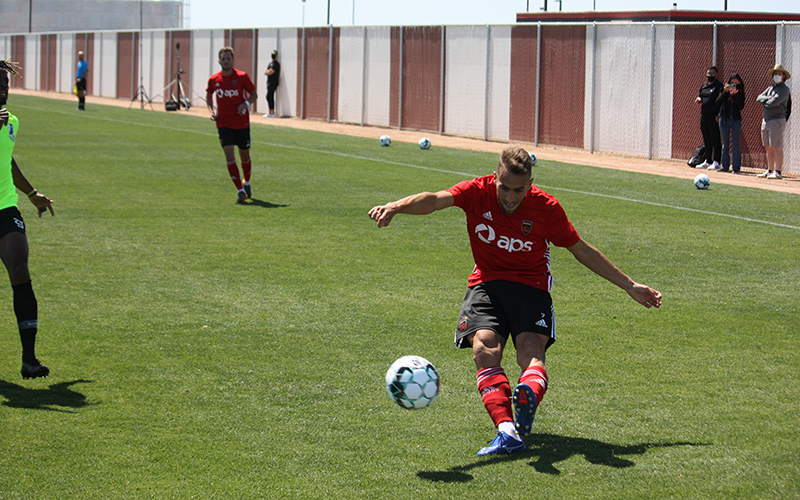
Phoenix Rising FC’s James Musa said he had to leave New Zealand “to become a professional soccer player, and so does every other Kiwi.” (Photo courtesy of Phoenix Rising)
CHANDLER – Phoenix Rising FC players James Musa and Noah Billingsley took different routes to reach their goal of playing professional soccer. But neither path came without challenges for two young players growing up in New Zealand, where a different kind of football – rugby, not soccer – is a national obsession.
“As far as myself, I had to leave the country to become a professional soccer player, and so does every other Kiwi,” Musa said.
The island country, whose capital of Auckland is located about 1,400 miles southeast of Sydney, Australia, is small enough that one can visit the ocean and the mountains within a matter of hours. New Zealand’s small population and the lack of financial support for soccer programs are likely reasons there is no professional soccer league in the country.
New Zealand has an estimated population of 5 million, and its closest neighbor Australia has 25 million.
“(New Zealand) is a small country so the economics within the football ecosystem is also small,” said Gordon Watson, a soccer broadcaster in New Zealand. “And as we’ve gotten better at football, players have realized that there is an opportunity to go abroad.”
Musa and Billingsley have blazed the trail.
“With players like these two making it with Phoenix Rising, it demonstrates that there is a pathway that exists outside of what is currently here,” Watson said.
That pathway has led the pair to Phoenix Rising FC, which they have helped to the top of the USL’s Western Conference standings with a 24-4-6 record. The Rising host Las Vegas Lights FC tonight at 7:30.
As Musa recalls, his opportunity to play professional soccer occurred somewhat by chance.
“I just happened to get lucky and a coach saw me play in high school, and he said come and try out for the pro team,” he said. “And I came down to the trial, and they signed me. I wasn’t trying to be a professional. I just fell into it. Very lucky.”
Watson, the broadcaster, said New Zealand joining the Oceania Football Confederation in 2006 led to increased visibility and a rapid growth in soccer. More success came at the youth national level, but tumult and challenges made it difficult to keep up with the fast growth.
“It’s a good thing to be on the world stage, but unless you get results, given the geopolitics of world football, there’s only so long one can sustain that,” he said. “It’s not like where you see in Europe, where it’s a very defined pathway with minor adjustments: This was a quite volatile environment.”
The MLS, the highest soccer league in the United States, has existed since 1993. And the USL Championship league, which Phoenix Rising FC participates in, was formed by the joining of two existing leagues before the 2011 season.
New Zealand does not have a men’s professional soccer league, and Wellington Phoenix FC, which was formed in 2007 and plays in the Australian League or “A-League,” is still the only men’s professional soccer club in New Zealand.
The A-League consists of 12 teams, which include 11 Australian teams, and Wellington Phoenix based in Wellington. Wellington Phoenix plays its home matches at Sky Stadium – shared by rugby and cricket teams – which has a full capacity seating at 34,500.
Musa, now 29, said by the time he was 17, he was playing with men and signed his first professional contract for Wellington Phoenix FC in 2010. He spent several years playing in New Zealand and Europe. He moved to the U.S. to play for Saint Louis FC in 2015.
The defensive midfielder was born in Plymouth, England, where his dream of playing professional soccer first developed. He reminisced about the time his mom worked for an English football club, and he acted as the mascot for the team.
For the English, soccer had been around since the 19th century, so there has long been a robust soccer system with various leagues and divisions for aspiring soccer players.
But when Musa moved to New Zealand, that dream seemed as distant as the English port city his family had just left. In 1999, New Zealand had a population of about 4 million, and Whanganui, the town where his family settled, had a total population of 25 to 30 thousand, Musa said.
“When my parents moved to New Zealand, there was nothing,” Musa said. “So, all that work I did at 5, 6 and 7 (years old) … to go to New Zealand, and I’m getting coached by someone’s mom or dad.
“The dream slowly goes because there’s nothing to look after.”
The dream made a comeback after Musa was spotted by a coach. Still, he is one of the few players who started his professional career in New Zealand. He also represented his country at the youth and senior level.
“I was one of the first kids to sign as a pro out of New Zealand. Aside from that, the only other way to go pro is to make the New Zealand U-17 or U-20 team,” he said. “And we’re lucky because our qualifying route to get to the World Cup is through Oceania, so we don’t have to play like Australia or any Asian team; it’s just the island teams. So, we qualify for most of them.”
Wellington-born Billingsley, who is on loan from Minnesota United FC in the MLS, took the college route to obtain his education and continue his playing career.

Noah Billingsley said the academy system helped him land a scholarship to play at UC Santa Barbara. After his standout collegiate career, he was selected as the 18th overall draft pick by Minnesota United FC in the 2020 MLS SuperDraft. (Photo courtesy Phoenix Rising)
The defender, 24, said his pathway was likely easier than Musa’s due to the more developed academy system that he played in from age 13 to 18. The academy system helped him land a scholarship to play at UC Santa Barbara (2016-2020). After a standout collegiate career, he was selected as the 18th overall draft pick by Minnesota United FC in the 2020 MLS SuperDraft.
“I could have gone pro like James did, but for me personally and my mom, it was important to get a degree and just from a maturity standpoint,” Billingsley said.
“I probably wasn’t ready to go pro at 18,” added Billingsley, who has also represented his country at the youth and the senior levels.
The academy system was virtually nonexistent during Musa’s childhood in New Zealand where, he said, “Sports is for fun in our country and not to do with money and business-related.”
“That’s my disappointment coming over here (to the U.S.) because it kind of takes the fun out of everything when it has to do with money,” he said. “And you limit some kids because some kids can’t afford it and a lot of talent goes missing.”
The growth of the academy system has expanded the opportunities for players like Billingsley and those who have followed.
The success of the youth academies in New Zealand featured coaches working together to design experiences for all athletes rather than competing against each other, Watson said.
But it wasn’t just the soccer structure that differed in New Zealand compared to the U.S., Musa said. The mindset was different, too.
“Most people here, the life is to go to college. Everything is college-related. If you don’t go to college you’re seen as a failure. Whereas for us (in New Zealand), it’s just an option,” Musa said.
In New Zealand, one can pursue a college degree, but it isn’t necessary to be competitive in the job market. One can also start a trade by 17 or 18 and own a business in one’s early 20s, Musa said.
Soccer opportunities may be one reason Kiwis are looking abroad. Watson also believes New Zealanders, being so geographically far from the rest of the world, have a natural curiosity – footballer or not – to see what is outside the boundary of their small island nation.
Despite the lack of a pro soccer league in New Zealand, Musa and Billingsley agree that the freedom and the small island’s lush and diverse scenery make it a special place.
They also agree on one other thing about their home country: a love for meat pies. But this is where they part ways – again.
Billingsley’s favorite pie is the meat and cheese. Musa prefers the chicken-flavored pie but enjoys the meat and cheese as well.

